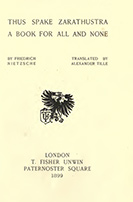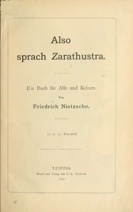Thus Spake Zarathustra: A Book for all and None
“Some new pieces of music encumbered the music-stand in the lower room and on his shelves stood two volumes by Nietzche: Thus Spake Zarathustra and The Gay Science.”
-“A Painful Case” (D 112)
In “A Painful Case” James Duffy acquires a copy of Thus Spake Zarathustra after he stops seeing Mrs. Sinico. Nietzsche’s ideas increasingly garnered an Anglophone audience in 1890s Britain. The T. Fisher Unwin edition included here was the most prominent English translation during this period. Even Grant Richards, who later published the first edition of Dubliners, issued a study of Nietzsche’s work, Thomas Common’s Nietzsche as Critic, Philosopher, Poet and Prophet: Choice Selection from his Works, in 1901.
In his autobiography Nietzsche decries the small audience for his works in Germany despite the wide readership across the globe:
for everywhere else I have readers—nothing but first-rate intellects and proven characters, trained in high positions and duties; I even have real geniuses among my readers. In Vienna, in St. Petersburg, in Stockholm, in Copenhagen, in Paris, in New York - everywhere I have been discovered; but not in the shallows of Europe, Germany. (Ecce Homo 262)
In Dublin at the turn of the century, Nietzsche had at least two readers—one real and one fictional. Around 1903 Joyce took an interest in the Nietzsche who was becoming increasingly fashionable among the Dublin intelligentsia. Joyce bestowed a similar fascination with the philosopher upon the fictional Duffy. Yeats and many others came to know Nietzsche through Havelock Ellis’s commentaries in the Savoy during the 1890s. In 1904 John Eglinton interpreted Nietzsche for an Irish literary audience in his literary magazine Dana. Here he summarized popular reactions to the philosopher in Ireland:
Although Nietzsche may fairly be described as a dangerous author, there is the same kind of natural safeguard against the corruption of his readers as that which preserves the schoolboy from corruption by the more highly-coloured passages in the works of Horace and Ovid which are placed freely in his hands, and may excite the misgivings of parents. (“A Way of Understanding Nietzsche” 182)
Around the same time that Eglinton’s essay came out, Joyce submitted a manuscript, which would be the genesis of Stephen Hero, to Eglinton and his co-editor at Dana Fred Ryan. The editors rejected the piece on the grounds of its incomprehensibility and sexual themes. The notions of the Übermensch, which appear in Thus Spake Zarathustra, are parodied and explored throughout Stephen Hero and Joyce’s later works.


